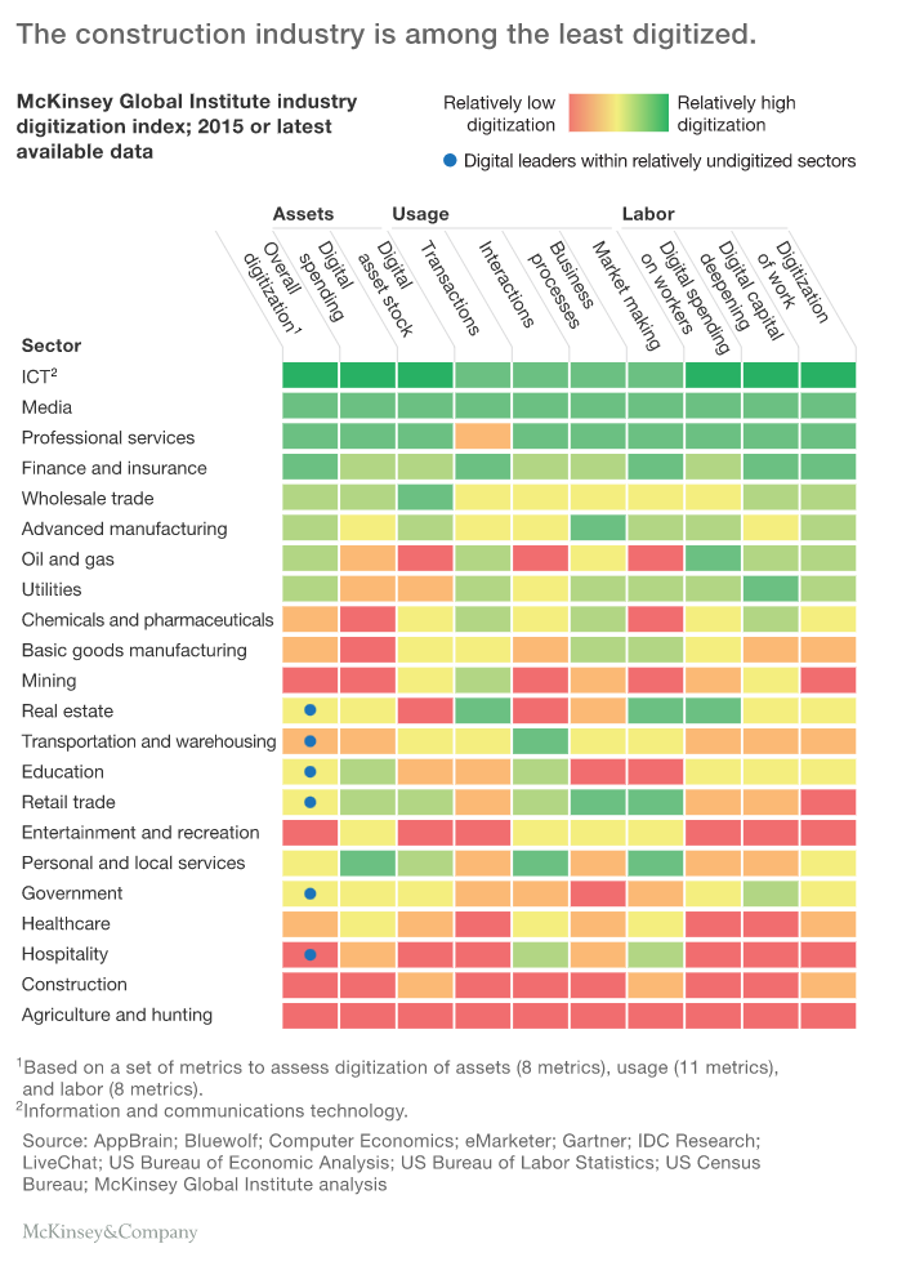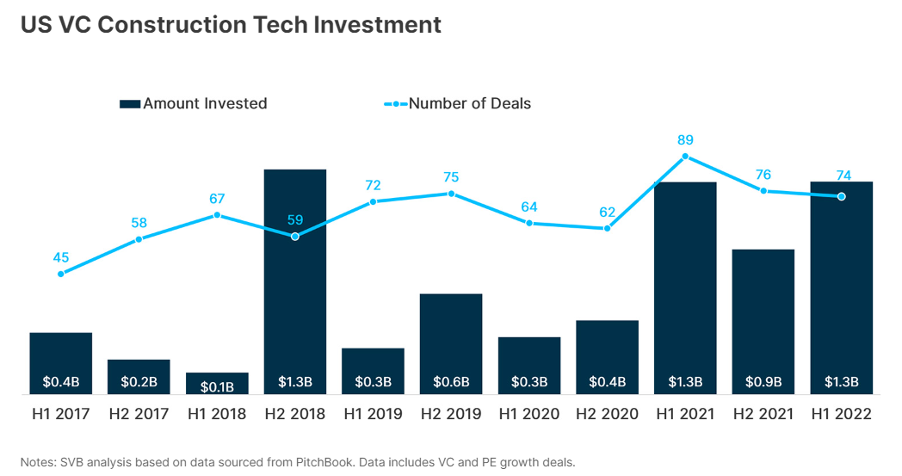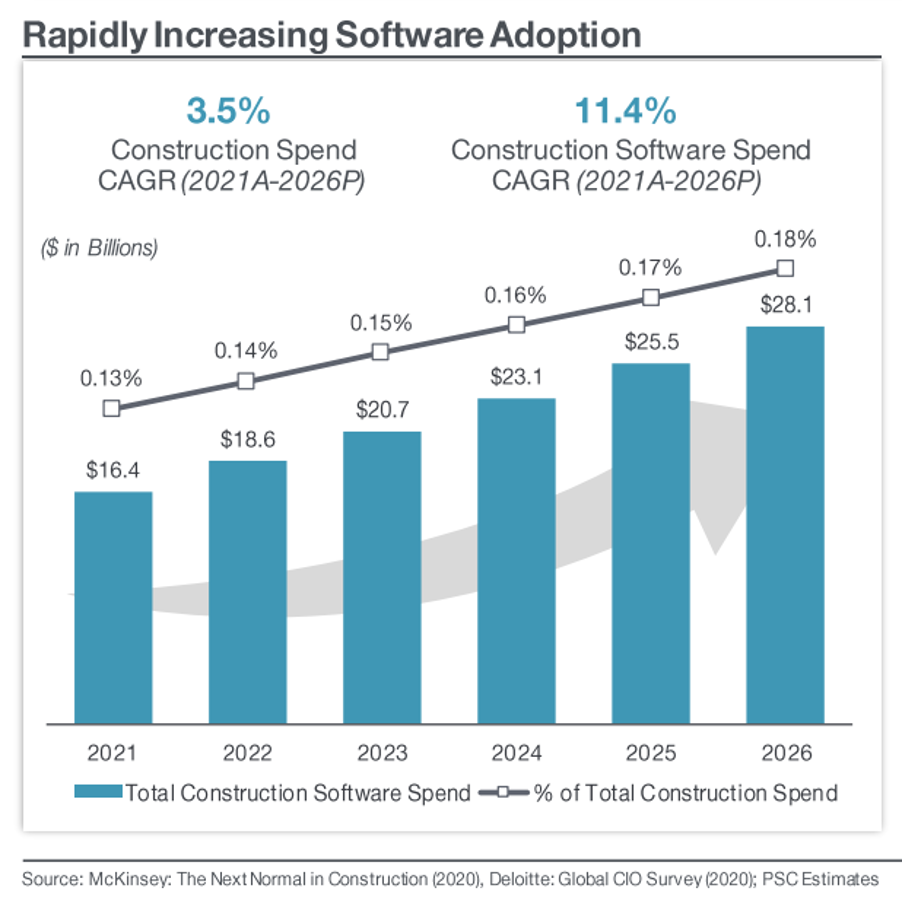The construction industry has regularly been at the back of the pack when it comes to innovation and productivity. This has been illustrated over the years by numerous reports, some especially high-profile ones from McKinsey & Company:

In recent years, the pace of innovation has accelerated, and digital tools have become an increasingly critical component of business processes in the construction industry. From building information modelling (BIM) and drones to 3D printing and robotics, technology is transforming every aspect of construction, from design and planning to materials procurement and project management. As the demand for sustainable, affordable, and innovative building solutions continues to grow, the construction industry's reliance on technology is only set to increase, driving new breakthroughs and pushing the boundaries of what is possible in the built environment.
The role of startups in construction’s digital transformation
Innovative startups are playing a crucial role in driving the digital transition in the construction sector. These companies are leveraging cutting-edge technologies such as artificial intelligence (AI), machine learning (ML), and the internet of things (IoT) to transform every aspect of construction, from design and planning to materials procurement and project management. For example, some startups are using data analytics, AI and ML to analyze construction data and optimize construction workflows, while others are developing advanced materials and building systems that are more sustainable and cost-effective. By leveraging these technologies, these startups are helping construction companies to reduce costs, increase efficiency, and improve the quality of their projects.
Moreover, these startups are often more agile and flexible than established construction companies, which allows them to move quickly and experiment with new technologies. They are also more willing to take risks and try out new ideas, which can lead to breakthrough innovations. By working together and forming partnerships that are deeper than just supplier and user, these ideas and technologies can come to market more effectively and efficiently. This collaboration combines their strengths and expertise to drive innovation and is the key to digital transformation in the construction industry. Overall, innovative startups are proving to be an essential catalyst for change in the construction industry, helping to lead the way in the digital transition and driving new levels of innovation and efficiency.
Being a startup in the construction industry is not easy however, as there are numerous challenges to building out digital solutions and becoming established. Construction projects, both on and off the construction site, are complex, so finding the right person or route to get your first projects can be tricky. The industry still has very low margins so getting pricing correct before real ROI numbers have been established is also a barrier. Although mindsets are changing there is still a wariness of doing things differently, depending on the person you are engaging with.
In a wider context there has of course been a tech explosion in most other sectors with huge demand for tech talent driving up wages and forcing startups of all kinds to raise more money to compete. This context has shifted in the last few months, with a collapse in valuations and the infamous laying of tens of thousands of workers from the likes of Google, Amazon, Facebook and beyond.
The construction digital transformation has been a huge growth sector in terms of VC money, and it appears to have been slightly sheltered from the recent troubles. There has been billions poured into the sector over the last few years as the opportunity to digitize the industry has become more apparent. Given construction workers and the industry itself can be protected from external market forces in certain ways (government spending on infrastructure can help keep that part of the economy moving) then perhaps construction tech firms have an opportunity to snap up highly experienced tech talent in the wake of the recent layoffs?

This flood of money has also been accompanied by the necessary growth in spending from construction companies to adopt this tech and see gains. Some of the largest construction companies are very mature in their digital thinking and this will see them pull ahead of the competition in terms of profitability and work won.

The adoption of digital technologies in construction is poised to create a runaway productivity revolution that could transform the industry. By leveraging technologies such as BIM, AI, and robotics, construction companies can streamline processes, reduce waste, and optimize the use of resources, ultimately leading to increased productivity and profitability. Moreover, the use of digital technologies can help to improve collaboration and communication between stakeholders, which can help to reduce errors, improve quality, and speed up project delivery.
With the construction industry facing significant challenges such as labour shortages, rising costs, and environmental concerns, the adoption of digital technologies is becoming increasingly critical to remain competitive and sustainable. Overall, the integration of digital technologies in construction is set to revolutionize the industry, enabling construction companies to deliver better projects, faster, and at lower cost, ultimately benefiting society as a whole.



